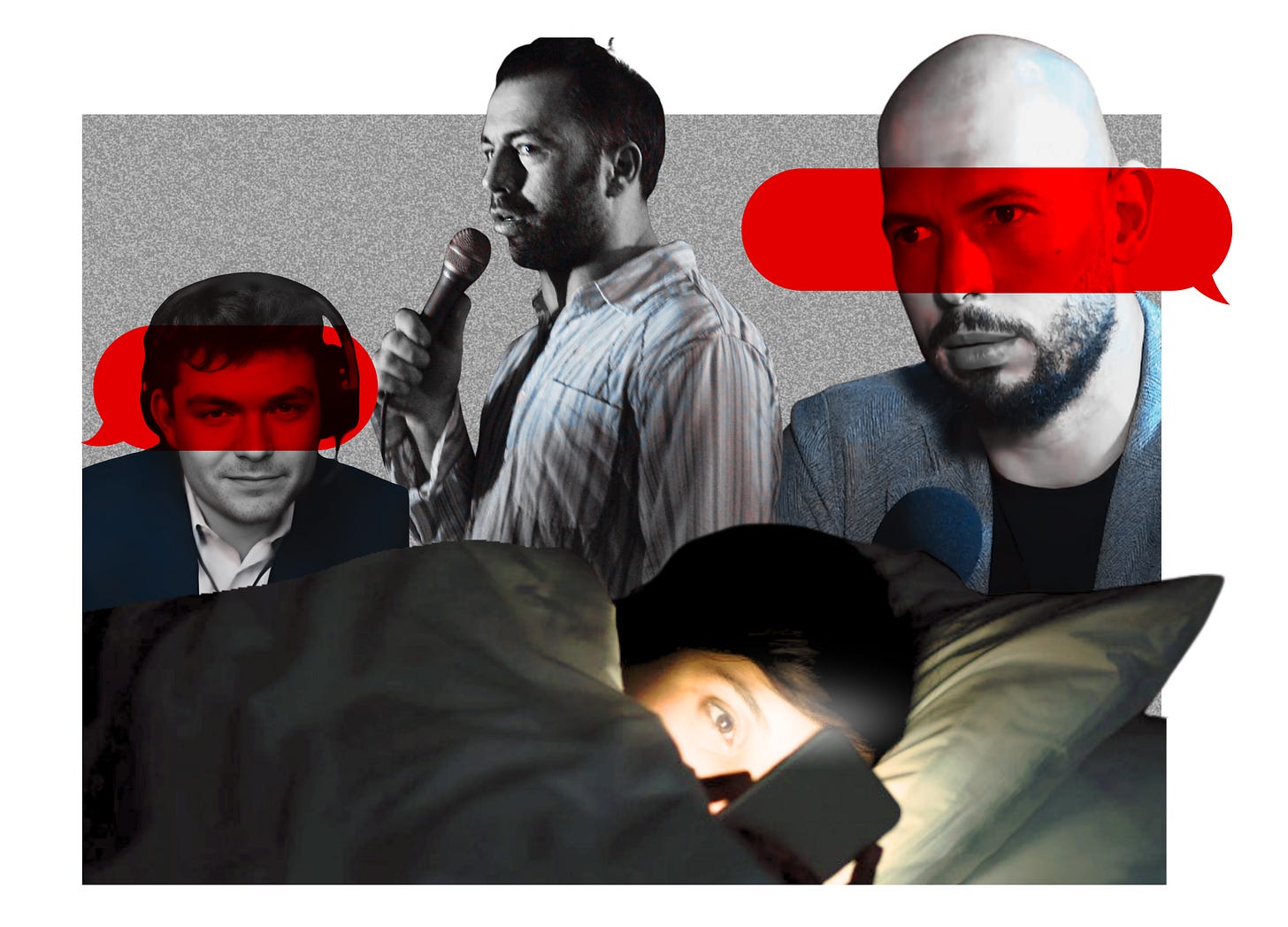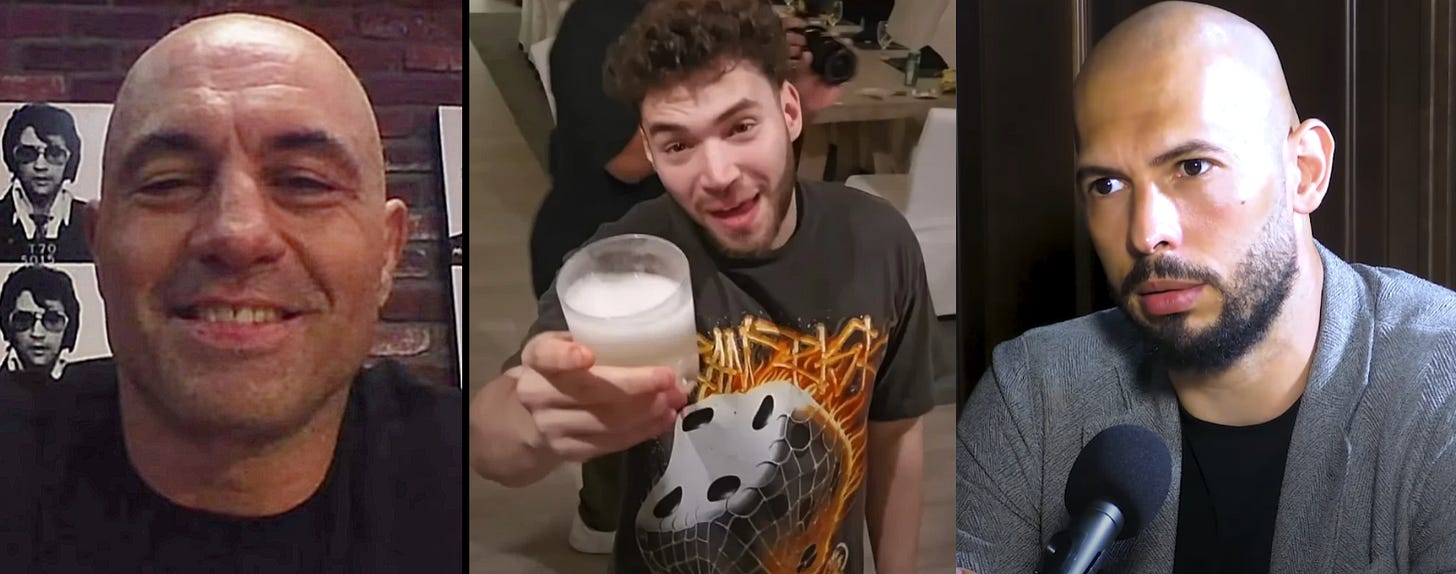How Far-Right Manfluencers Are Grooming Lost Boys
There is increasing evidence that suggests manfluencers like Nick Fuentes and Andrew Tate are contributing to a rise in domestic abuse, physical violence and even terrorism.

On Nov. 5, 2024, shortly after Donald Trump won the election, Nick Fuentes, a white nationalist Holocaust denier, posted to X, “Your body, my choice. Forever.”
Over 100 million people saw the post. It was part of a surge of sexist and abusive hate and harassment toward women, LGBTQ people and other minorities that came after Trump’s reelection.
In a similar post the next day, far-right influencer Andrew Tate responded to a user who asked for a president that is not a rapist. “REQUEST DENIED,” responded Tate. In another response to a left-wing influencer who posted that “American decency was destroyed tonight,” Tate responded by writing, “Crying faggot alert.”
Tate, an influencer with more than 10 million followers on X, has compared women to dogs, believes it should be illegal for them to drive and thinks they should “bear some responsibility” for being raped. He himself is currently under criminal investigation over a string of allegations, including human trafficking and sex with a minor.
Tate and Fuentes may seem like extreme examples, but they’re far from alone when it comes to far-right male influencers, or manfluencers, who find internet fame by hating on minority groups.
Adin Ross, who has 2.6 million followers on X, went on a homophobic rant on the streaming service Kick: “You’re wearing a pink beanie. You’re a grown man. Kill yourself. Kill yourself, fag. Please die. Nobody will care. Please do the world a favor,” he said, at a time when 41% of LGBTQ kids in the U.S. considered suicide.
Matt Walsh, who boasts 3.6 million followers on X, has profited from bullying trans kids, writing a children’s book that compares being trans to being a walrus. And Joe Rogan, who has the third most popular podcast on Spotify, has said trans people will cause societal collapse and has used vile language to describe trans people using the bathroom: “You can’t just put lipstick on and now you can shit in the women’s room!”
While narratives about LGBTQ people grooming and indoctrinating kids are pervasive in far-right spaces, there is increasing evidence that suggests so-called far-right manfluencers are pushing the next generation of men to more extreme positions that many experts warn are contributing to a rise in domestic abuse, physical violence and even terrorism.
“These online spaces that are much, much more accessible, particularly to young boys, they're sort of grooming kids. Right?” says Gretchen Baldwin, a senior researcher at the Stockholm International Peace Research Institute. “Maybe they're not directly sending these kids to the more extreme dark corners of the Internet, but they're preparing them. They're laying the groundwork for kids to then go toward these more extreme movements.”
But what’s making far-right manfluencers so successful in 2025? And what tactics are they using to lure in young men and boys and keep them watching?
Loneliness and Despair
One reason far-right manfluencers are seeing such success today is because they are capitalizing off of a loneliness epidemic. According to a 2021 study by the Survey Center on American Life, the percentage of men who report having no close friends has risen fivefold since 1990, with 15% of men reporting having no close friendships. In addition, the male suicide rate was four times higher than that of females in 2022.
“We’ve lost a lot of third spaces,” says Baldwin, referring to spaces outside the home and work that we can socialize in, such as coffee shops, malls and bowling alleys. “So now the Internet in many ways [has become] that third space.”
Baldwin says these far-right manfluencers offer an online place that feels traditionally masculine where boys can connect with other guys. Some aspects of these communities are innocuous: Tate provides his followers with workout routines and motivational speeches. He also offers a program called The Real World, that aims to teach young men—for $49.99 a month—about cryptocurrency and e-commerce, with a focus on Tate's "41 Tenets for men."
But much of these influencer's rhetoric is rooted in ideals of Christian nationalism, white nationalism and misogyny. In 2021, Fuentes created his own streaming platform, Cozy.tv, with far-right conspiracy theorist Alex Jones. Since then, Fuentes has called for holy wars against Jewish people; professed his love for Hitler; encouraged a Catholic Taliban-style government in the U.S.; labeled homosexuality “disgusting”; and has said women shouldn’t be allowed to vote.
“One of their tools is emphasizing that [young men] are being left out. ‘You're being left behind. You're being pushed out of the center by women, gay people, immigrants, Black people, Brown people,’ is what they tell them,” says Baldwin.
“They feel kicked while they're down,” she says.
Men are indeed struggling, with millions of them having dropped out of the workforce and women continuing to outpace them in college enrollment and graduation. These manfluencers recognize this struggle and blame minorities for their hardships. In doing this, they reaffirm a traditional male privilege.
“If things aren’t working out for you, then packaging that entitlement and the grievances that come from it and harnessing it against women and against LGBTQ people allows them to take advantage of things that men and boys in our society have been socialized into thinking that they're entitled to,” says Rachael Fugardi, senior program manager of partnerships at the Southern Poverty Law Center (SPLC).
Activating Hate That Already Exists
Another reason far-right manfluencers see such success is because many Americans approve of this extreme rhetoric. A 2023 study found that 56% of fathers aged 35 and younger and 23% of teen boys had a favorable view of Andrew Tate.
Additionally, Tate’s brand of hate has spread to impressionable young boys in classrooms across the U.S. and the United Kingdom. And teachers around the world have shared on social media that they’ve “seen an uptick in male students repeating sexist vitriol in class to get a rise from their classmates and teachers.”
In 2023, Tate had become such a problem that the UK government asked teachers not to discuss him in class. Despite this, a primary school had to call in a charity to talk to students after four 9-year-old boys—some of whom said they had no problem with Tate’s views—locked a girl in a cupboard, threatened to “fuck her in the throat” and then made her watch porn video clips. One teacher said that during the harassment workshop, one student frequently referenced Tate, saying: “You shouldn’t take no for an answer [from a girl] as that shows weakness.”
In America today, Fugardi says the political climate is only making things worse. “We're seeing rhetoric that is hard to imagine showing up in classrooms after Trump was elected,” she says, noting that men under 30 were one of the groups that swung sharply toward Trump in the 2024 election, with more than half of them voting for him.
Trump himself engages with these manfluencers and made it integral to his campaign. And his actions have echoed the ideology of many popular manfluencers.
He has dined with Fuentes at Mara-Lago, has been accused by at least 26 women of sexual misconduct and rape, has been found liable in court for sexual abuse and has said he will protect women “whether they like it or not.”
“I think these influencers become a lot more normalized when it is endorsed in the highest levels of American government,” says Lydia Bates, a program manager at SPLC who works alongside Fugardi.
A Helping Hand from Big Tech’s Algorithm
In addition to feeling emboldened by the current political climate, far-right manfluencers’ bad behavior is rewarded by algorithms created by big tech companies. “The things that Andrew Tate is saying [are] not new. What's new is the platform that he has [and] his ability to manipulate algorithms and poorly enforced social media policies that gets into all of our homes,” says Fugardi.
A 2024 study by the University of Kent found that after only 5 days on TikTok, users were subjected to a fourfold increase in the level of misogynistic content being presented on the platform's “For You” page.
And a 2024 study from Dublin City University’s Anti-Bullying Centre found that YouTube’s “recommended video” feature was also responsible for quickly pushing manosphere, or alpha male and anti-feminist, content to accounts. “All of the male-identified accounts were fed masculinist, anti-feminist and other extremist content, irrespective of whether they sought [it] out. … They all received this content within the first 23 minutes,” the study found.
Once the user showed interest, the amount of content rapidly increased. By the last round of the study’s experiment, 78% of the YouTube videos and 76% of the TikTok videos being recommended were toxic, primarily falling into the manosphere category. The authors of the study described the content as “rail[ing] against equality and promot[ing] the submission of women.” Much of this was anti-transgender content.
YouTube did not respond to a request for comment. In an email statement, TikTok told Uncloseted Media that “misogyny has long been prohibited” on their platform. They referenced their Community Guidelines that call misogyny a “hateful ideology.”
“Not Just A Joke”: Irony Poisoning
As young men are fed this content, a key tool used by far-right manfluencers is irony poisoning. “[Tapping into humor] helps normalize that way of talking and behaving,” says Lucas Gottzén, a professor of child and youth studies at Stockholm University, whose research focuses on men’s studies and violence. “They hide behind trolling and minimizing the hate by saying, ‘I didn’t mean it, it’s just for fun.’”
One viral example of irony poisoning is when Fuentes did a Rumble livestream in 2024. He told his 234,000 viewers that he’s part of Trump’s “paramilitary wing” and “if Donald Trump called me up and said, ‘Look, we need to capture my political enemies and torture them’ … I would be like, ‘sir, yes.’” After he was done with his monologue, he told his viewers, “I'm kidding, kidding, kidding, kidding. Dude, listen, we're just having fun with it, OK? … It's all jokes. Don't worry. I'm just kidding. OK?”
Bates and her team at the SPLC don’t think it’s funny. In a 2024 report they wrote titled “Not Just a Joke: Understanding & Preventing Gender- & Sexuality-Based Bigotry,” the SPLC team connected irony poisoning to more extremist behavior.
“Edgy humor, the ‘not just a joke’ thing, is a massive segue into male supremacist content. They're also preying on young men and boys' insecurities in terms of their physical appearances, their romantic relationships, their finances,” Bates told Uncloseted Media.
Connections to Violence Against Women And Terrorism
One 2023 study by Women’s Aid found that children and young people exposed to misogynistic content were “more likely to think there should be a more dominant person in a relationship and also viewed hurting someone physically as more acceptable.” In addition, the Department of Homeland Security says, “The threat of violence from violent extremists radicalized in the United States” is high.
According to the Global Terrorism Index published on March 5, Western countries in 2024 saw their first major rise in terrorist incidents since 2017, with lone-wolf attacks accounting for 93% of fatalities over the past five years. In the UK, minors accounted for 42% of terror arrests last year, reflecting a broader Western trend where youths account for one in five terror suspects.
On top of all of this, the percentage of hate crimes against all minorities continues to rise year after year.
“We have proof that a number of mass casualty events, gun violence events in the U.S. were carried out by men who have frequented far-right chat rooms,” says Baldwin.
And even for the many folks who don’t take it to the extreme of terrorism, there are some alarming implications to this rhetoric. “Research shows that young boys who are consuming misogynistic content online are more likely to respond to surveys saying that violence [in a relationship] can be okay if you say sorry afterward. So there's a direct link between this kind of rhetoric and real-world violence,” says Fugardi, adding that one in three women have experienced physical or sexual violence, often by an intimate partner.
What Can Be Done?
Gottzén says calling out hateful behavior doesn’t go far enough and that we have a responsibility to understand the issues young men and boys face in today's world to combat this crisis. “It's very easy to say, ‘Yeah, this [is] misogynistic.’ … But you have to actually try to counteract that,” he says. “I think that it's good to criticize men, and these influencers, but you also need to understand and listen to the issues of the young heterosexual men who follow them and get into that loop.”
“We really need men in young people's lives to engage in these spaces. And it doesn't just have to be dads. It can be male coaches. It can be any man in a young person's life,” says Baldwin.
If parents are concerned their boys could be experiencing online radicalization, Baldwin points to resources like Equimundo, which provides resources that give more information on the manosphere. If a child requires deradicalization, she recommends programs like Life After Hate.
Fugardi and Bates agree that focusing on the struggles men face is critical. “We do need to be addressing loneliness and mental health and all these things, but we need to address that for its own good. And we need to [independently] address misogyny and perceptions of entitlement and sexual aggression, dominance and supremacism.”
Tate and Fuentes did not respond to Uncloseted Media’s request for comment.
Additional reporting by Ben Land.
If objective, nonpartisan, rigorous, LGBTQ-focused journalism is important to you, please consider making a tax-deductible donation through our fiscal sponsor, Resource Impact, by clicking this button:










This is exactly whats happening , but there’s hope. We are doing a long multipart https://thistleandmoss.com/p/the-death-of-far-right-politics-and